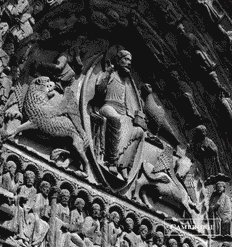
This epistle admirably illustrates the temper taught by St. Paul (2 Tim. ii. 24), and not less the peculiar social relations of converts to the Gospel. Mathetes was possibly a catechumen of St. Paul or of one of the apostles. Many scholars think that his correspondent, Diognetus, was the tutor of M. Aurelius. The author names himself as Mathetes, but no one can say more of his identity. What interests me is the description he gives of early Church communities. Do you think Mathetes is describing the communities in an ideal or realistic manner? I am inclined to think 'both' for my answer. Read this excerpt and decide for yourself:
For the Christians are distinguished from other men neither by country, nor language, nor the customs which they observe. For they neither inhabit cities of their own, nor employ a peculiar form of speech, nor lead a lifewhich is marked out by any singularity. The course of conduct which they follow has not been devised by any speculation or deliberation of inquisitive men; nor do they, like some, proclaim themselves the advocates of any merely human doctrines.But, inhabiting Greek as well as barbarian cities, according as the lot of each of them has determined, and following the customs of the natives in respect to clothing, food, and the rest of their ordinary conduct, they display to us their wonderful and confessedly striking method of life. They dwell in their own countries, but simply as sojourners. As citizens, they share in all things with others, and yet endure all things as if foreigners. Every foreign land is to them as their native country, and every land of their birth as a land of strangers. They marry, as do all others; they beget children; but they do not destroy their offspring. They have a common table, but not a common bed. They are in the flesh, but they do not live after the flesh. They pass their days on earth, but they are citizens of heaven. They obey the prescribed laws, and at the same time surpass the laws by their lives. They love all men, and are persecuted by all. They are unknown and condemned; they are put to death, and restored to life. They are poor, yet make many rich; they are in lack of all things, and yet abound in all; they are dishonoured, and yet in their very dishonour are glorified. They are evil spoken of, and yet are justified; they are reviled, and bless; they are insulted, and repay the insult with honour; they do good, yet are punished as evil-doers. When punished, they rejoice as if quickened into life; they are assailed by the Jews as foreigners, and are persecuted by the Greeks; yet those who hate them are unable to assign any reason for their hatred.
So we read about surpassing the legal expectations of the secular laws; not destroying our babies; not condoning adultery. These three stand out as extremely early representations of Orthodox ethical notions. Also, the whole attitude of turning the other cheek and being rich through having little bleeds throughout the epistle and it astounds and inspires me. This epistle is a lot like the Didache in that it is more revelant and fresh than even the morning news! Why is it that Irenaeus, Ignatius and Clement are still such manly and pertinent figures?

6 comments:
Thanks for mentioning this great Epistle, Thomas. I wonder if "Mathetes" is actually sort of a literary device, since it is the Greek word for "Disciple," so that's how the writer names himself. I love the way that this letter show the vigor of the Apostolic era. Ignatius, Irenaeus -these were amazingly tough and resourceful people. "All grown up."
Yes, I think it is a shrewd guess that the name itself is a device, a pseudonym, but since we don't know what his called name was, it is reasonable to call him what he calls himself. I think the letter is so strikingly Pauline in tone; so hence my suggestion that he was instructed by St. Paul or someone very close to the spirit of The Apostle. Irenaeus and Ignatius are both so all grown up, as you say -- I'd say, 'all manly' -- but don't they strike you differently? I mean that Irenaeus was so clear cut, logical and thorough with his points, while Ignatius was so poetic and profound, often expressing the ineffable through his metaphors. Often I have the sense that Irenaeus would have had an extremely low tolerance for BS. I like that about him, and the way he'd use wit to ridicule what was knowledge falsely so called. We need his spirit today, don't we?
As for the great Syrian saint, I must say the only churchmen whose writings come close to his in terms of passion and expressing the ineffable would be two other Syria saints: Ephraim and Isaac. There must have something in baptismal waters in Syria!
I really appreciated this post.
I think this Lent I will explore more early christian writings.
how rich a heritage.
I never knew.
thanks thomas.
fcindeed.
that is, indeed.
I think Mathetes is more Pauline, and Ignatius and Irenaeus seem more Johaninne to me. And you're totally right. None of them had any truck with BS. Irenaeus grew up in the Church of Smyrna, where Polycarp was his Bishop and beloved pastor. And we know that Polycarp was taught about Christ by none other than John the Theologian. Reading their letters and books, I can almost 'feel' their apostolic energy and strength!
Post a Comment